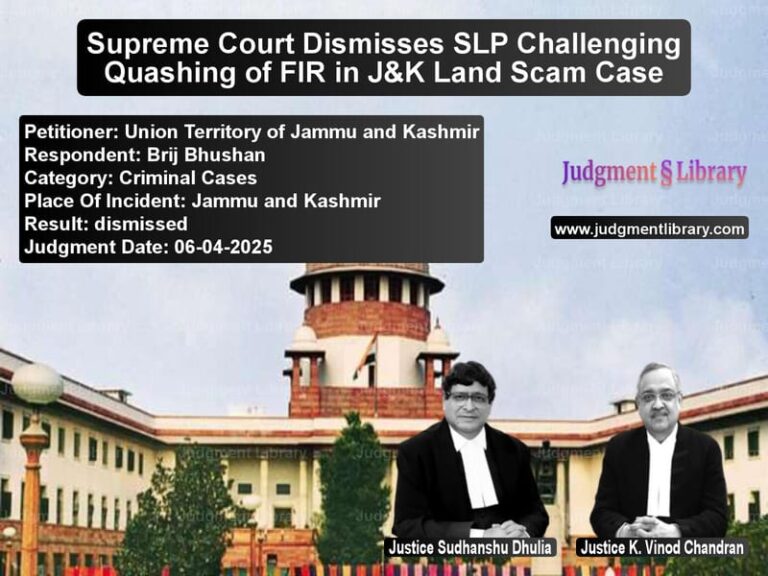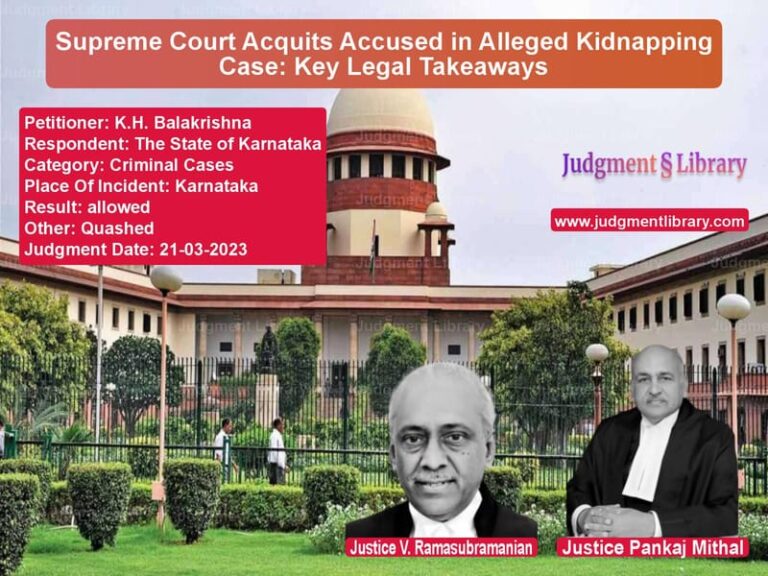Income Tax Registration: Supreme Court Clarifies Powers of CIT Under Section 12A
The Supreme Court of India recently ruled in Industrial Infrastructure Development Corporation (Gwalior) M.P. Ltd. v. Commissioner of Income Tax, addressing a crucial issue regarding the cancellation of registration granted under Section 12A of the Income Tax Act, 1961. The judgment clarifies whether the Commissioner of Income Tax (CIT) has the authority to cancel a registration certificate once granted and the applicability of Section 21 of the General Clauses Act in such cases.
Background of the Case
The case involves Industrial Infrastructure Development Corporation (Gwalior) M.P. Ltd., a state government undertaking engaged in developing industrial growth centers in Madhya Pradesh. The appellant had applied for registration under Section 12A of the Income Tax Act, claiming it was engaged in a charitable purpose under Section 2(15) of the Act.
In 1999, the CIT (Gwalior) granted registration under Section 12A but reserved the right to examine the exemption claim during tax assessment. However, in 2000, the CIT issued a notice proposing the cancellation of the registration, citing that the appellant was not engaged in charitable activities.
Despite the appellant’s objections, the CIT, by order dated April 29, 2002, canceled the registration. The appellant filed a rectification application under Section 154, arguing that the CIT lacked the power to revoke a registration once granted. The application was dismissed on December 20, 2002.
Legal Issues
- Does the CIT have the power to cancel a registration granted under Section 12A of the Income Tax Act?
- Can Section 21 of the General Clauses Act be applied to justify the cancellation?
- Does the Finance Act, 2004, which introduced cancellation powers under Section 12AA(3), apply retrospectively?
Arguments Presented
Petitioner (Industrial Infrastructure Development Corporation)
The appellant contended:
- Once registration is granted under Section 12A, the CIT has no authority to cancel it unless expressly provided by law.
- Section 21 of the General Clauses Act, which allows modification or rescinding of orders, applies only to executive or legislative orders, not quasi-judicial decisions.
- The power to cancel was only introduced through the amendment in Section 12AA(3) in 2004, which cannot be applied retrospectively.
Respondent (Commissioner of Income Tax, Gwalior)
The CIT argued:
- The registration was granted subject to review, and if conditions were not met, cancellation was justified.
- Section 21 of the General Clauses Act allows the CIT to revoke or modify the registration.
- The cancellation was legally valid and necessary to prevent misuse of tax exemptions.
Supreme Court’s Analysis
1. Powers of CIT Under Section 12A
The Court ruled that the CIT lacked the express power to cancel a registration granted under Section 12A before October 1, 2004, when the Finance Act introduced Section 12AA(3). The Court stated:
“The CIT had no express power of cancellation of the registration certificate once granted under Section 12A till 01.10.2004. There was no provision in the Act allowing such cancellation.”
2. Section 21 of the General Clauses Act
The Court rejected the argument that Section 21 could be used to revoke a quasi-judicial order like a registration certificate. It held:
“An order under Section 12A is quasi-judicial, not executive or legislative. Section 21 applies only to executive or legislative actions, not quasi-judicial orders.”
3. Retrospective Application of Section 12AA(3)
The Supreme Court clarified that the amendment in 2004 was prospective and could not be applied to cases before its enactment. It ruled:
“The CIT’s cancellation order, made before 01.10.2004, is illegal as there was no statutory power to do so at the relevant time.”
Supreme Court’s Verdict
The Supreme Court set aside the Madhya Pradesh High Court’s ruling and restored the ITAT’s decision, which had ruled in favor of the appellant. The Court held:
- The CIT had no authority to cancel registration before October 1, 2004.
- Section 21 of the General Clauses Act does not apply to quasi-judicial orders.
- The appellant’s registration remains valid unless canceled under Section 12AA(3) after 2004.
Implications of the Judgment
This ruling has significant implications for tax law and charitable organizations:
- Protection for Charitable Organizations: The ruling ensures that tax-exempt entities cannot have their registration arbitrarily canceled.
- Clarification of CIT Powers: The decision limits the CIT’s authority, preventing retrospective cancellations without legal backing.
- Legal Precedent: This judgment provides a binding interpretation of the Income Tax Act regarding registration and cancellation procedures.
Conclusion
The Supreme Court’s decision in Industrial Infrastructure Development Corporation (Gwalior) M.P. Ltd. v. Commissioner of Income Tax reinforces the principle that statutory authorities cannot exercise powers beyond what is explicitly provided by law. By ruling against retrospective application of cancellation powers, the Court has ensured that tax-exempt organizations receive due process and protection under the Income Tax Act.
Petitioner Name: Industrial Infrastructure Development Corporation (Gwalior) M.P. Ltd.Respondent Name: Commissioner of Income Tax, GwaliorJudgment By: Justice R.K. Agrawal, Justice Abhay Manohar SapreJudgment Date: 16-02-2018
Don’t miss out on the full details! Download the complete judgment in PDF format below and gain valuable insights instantly!
Download Judgment: Industrial Infrastru vs Commissioner of Inco Supreme Court of India Judgment Dated 16-02-2018.pdf
Direct Downlaod Judgment: Direct downlaod this Judgment
See all petitions in Income Tax Disputes
See all petitions in Tax Evasion Cases
See all petitions in Banking Regulations
See all petitions in Judgment by R K Agrawal
See all petitions in Judgment by Abhay Manohar Sapre
See all petitions in allowed
See all petitions in supreme court of India judgments February 2018
See all petitions in 2018 judgments
See all posts in Taxation and Financial Cases Category
See all allowed petitions in Taxation and Financial Cases Category
See all Dismissed petitions in Taxation and Financial Cases Category
See all partially allowed petitions in Taxation and Financial Cases Category







